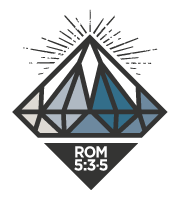The last month or two, we’ve been talking about how our pain is often a microphone (as Levi Lusko puts it in his book Through The Eyes of a Lion) and what to do with that microphone. You can find parts one, two, and three by clicking on them, but today I want to wrap up this series with what will (hopefully) be an encouragement: you don’t have to write a book.
I’ve talked a lot about how my writing (and in particular, my books) have been my “microphone of pain” to share God’s truth from. But that doesn’t mean you have to write a book or start a blog or host a conference.
Your microphone is going to look unique because you are unique. And that’s okay. In fact, that’s a really good thing. There are so many people that writing just isn’t a good way to connect with. I’m all for writing, and I will cheer you on if that is how God has called you to use your pain-microphone. But please know that there are so many other ways you can glorify God with your pain.

For example, Becca at LymeisLame shares a lot of her story on YouTube (and other social media) by vlogging, helping so many people understand Lyme and know that they are not alone. Or take another chronic illness warrior I met who finds other spoonies and writes cards, sending them all over the country just to brighten their day and encourage them in any way she can. She’s quiet, humble, and unobtrusive — I can’t even remember her name at the moment — but she serves so many going through things no one should have to. Then there’s Jessica. Though stuck at home a lot of the time, she is faithful to send me cheerful pictures with Scriptures on them, even when it’s been months since I replied to her email because of my own mental issues. And Mary, who spends a lot of time on Goodreads, slipping into author’s inboxes, and being an amazing cheerleader for so many of them.
Your pain is a microphone, but it doesn’t mean your microphone has to be a pen (or keyboard). You don’t have to write a book. Is that freeing? We see people around us serving God in amazing ways, but we forget that the behind-the-scenes, seemingly “small” ministering is pretty amazing too. In some ways, living truth and hope to the people in your everyday life is a more powerful way to point them to God than writing a book or using a more public microphone ever could be.
In fact, I wouldn’t recommend claiming a public microphone without some serious thought and prayer first. And even when or if you do, remember this for me, okay?
Protect your sacred.
You don’t have to share every detail and every dark, painful secret of your life with the world. Some things are meant to be just between you and God, or between you and those closest to you. There needs to be boundaries in nonfiction writing. Things that are sacred and meant to be private.
That doesn’t mean you shouldn’t write honestly and vulnerably. I mean, look at my writing — it’s definitely vulnerable. Raw. And often not pretty. I’ve told you guys about being given a month to live. I’ve told you about the hours spent rocking in the closet, crying uncontrollably as anxiety and depression hit. I’ve told you about some of the worst moments of my life — but not all of them. There are things that you would never guess. That even my closest, most trusted friends don’t know. Not because I love or trust them any less, but because there are things that are sacred. There are secrets that belong to other people — and though they affected me deeply, they are not mine to tell. And there are things that affected me so deeply that I can’t bring myself to share them. There are scars that hurt so deeply that I don’t know what to do with them, let alone how to share them. There are things I don’t have the answers to and things that will always be unread.
You can also share these things and the truth you learned through them without giving every single detail. Without mentioning names or saying exactly what it was. You know?
So first, know that your microphone doesn’t have to look like mine or anyone else’s. And second, remember to guard your sacred, whether your microphone is public or closer to home.
For more thoughts on protecting our sacred, see Belle’s wonderful post about it here.


Beautiful post, Sara! Thanks for this encouragement! <3
<3 My pleasure, glad you like it!
Amen! So true! <3 May we all ask God to reveal what that microphone looks like in our lives–wherever we are at this certain time. Thanks for writing this!
Amen! 🙂 Glad you liked it. 😀